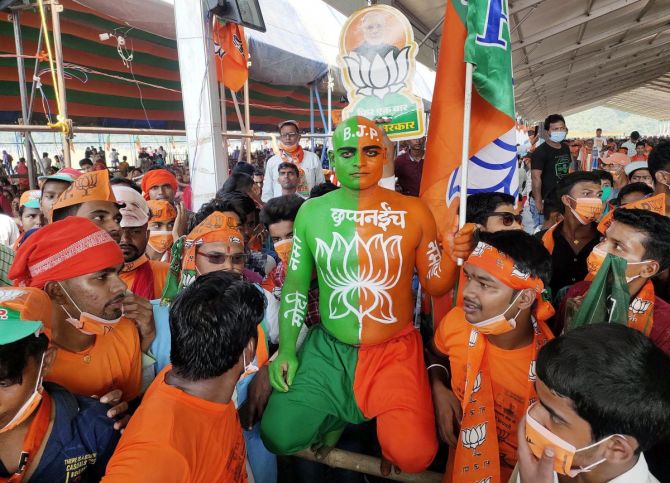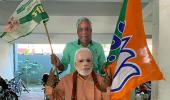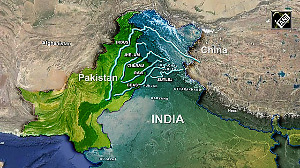This was a difficult election to win, but the Modi card, the caste divide and the division in the Opposition vote nbank helped overcome many challenges, reveals Sheela Bhatt.

The massive, silent polarisation of upper castes in Bihar on caste lines against the Mahagathbandhan, many women voters who are content with the National Democratic Alliance's social welfare projects, and the Yadav voters of the Muslim-dominated Seemanchal areas voting for the alliance helped its return to power in Patna.
The small margin in the NDA's victory was due to the extremely backward classes's intense support to the Communist Party of India (Marxist Leninist) Liberation in the Magadh region of Bihar and the faultlines that existed within the state Bharatiya Janata Party, and between it and the Janata Dal-United.
In a nutshell, the BJP squarely defeated the Congress plan to take away its upper caste voters; the Rashtriya Janata Dal did very well, but the Congress let it down; while the NDA was hit by the Leftists who won 16 seats, taking away many EBC voters crucial to the BJP's gameplan.
Tejashwi Yadav's election campaign had many strengths. The issue of unemployment in Bihar is serious, and he emerged as Bihar's son of the soil however privileged. Still he fell short because the NDA was focussed on basic caste identity -- which worked.
The result have not convincingly answered the question would the BJP have won a majority had it fought the election alone, without the burden of anti-incumbency against Chief Minister Nitish Kumar who has ruled Bihar for 15 years barring a year when Jiten Ram Manjhi was CM.
The BJP-JD-U's combined vote share was 34.85%, with the BJP's votes at 82,01,408 and the JD-U's at 64,84,414 votes. Against this, the RJD had a 23.1% vote share with 97,36,242 votes.
The NDA vote share was 37.3%, the same as the Mahagathbandhan's, while the other parties got a 25.4% vote share.
The BJP, and Prime Minister Narendra Modi at his rallies, did successfully 'memory revision' of the 'jungle raj' associated with the RJD, and restricted its vote share.
The Bihar election has produced a divided verdict.
The results have many new features, but the big picture is that it has given a pitch to the BJP to play a role in Bihar's future as it is now the senior partner in the NDA.
The voters have also accommodated the young leader Tejashwi's RJD to share space in Bihar's trajectory ahead -- poetic justice of sorts for the defeated.
All over India a kind of polarisation has been underway since the last few years on communal lines, more so since Modi became prime minister. But, in Bihar, around 25% of the votes have gone to tiny, local groupings of marginalised people, which is a heartening development since those who don't want to fall into the category of the anti- or pro-Modi divide will have geographically restricted representation at least.
Bihar has shown that the ideological divide and loyalty to the leader will be more overt and sharper in election campaigns, which ultimately affects the results.
The RJD didn't lose its traditional base of Muslims and Yadavs in spite of Modi's glamour power and his party's organisational might.
Even though Bihar is on the cusp of change, the change will come gradually.
BJP President Jagat Prakash Nadda, who was born and educated in Bihar, and Bhupendra Yadav, the party's general secretary in charge of the state, had before them an impossible task before the election.
Anti-incumbency against the NDA government and more so against Nitish Kumar, caste divides, the formidable rival alliance, the state's shrunken economy, the migrants's plight, absence of a strong BJP leader, a divided alliance and party all had made the task difficult.
The most difficult were Bihari voters who had taught tough lessons to the party in 2015.
Nitish Kumar declared a ban on liquor, but he did not draw out a policy to implement it efficiently, resulting in criminalisation of the trade. The result: A nexus emerged among notorious elements in villages and the local police.
Nadda and Yadav had to 'manage' the anti-incumbency against Nitish Kumar and also ensure that state BJP's shortcomings didn't obstruct its goal to get a majority.
This was a difficult election to win, but the Modi card, the caste divide and the division in the Opposition vote bank helped overcome many challenges. The small non-BJP alliances also helped the BJP scrape through in many constituencies.
Asked about the challenges they faced, Bhupendra Yadav says, "We didn't only read figures and data. We emphasised on trust. We looked for the vision of Atamanirbhar Bihar. Our rival RJD had issued a party manifesto twice, have you ever heard of any political party issuing its manifesto twice?"
"I have no doubt that PM Modi's pro-poor policies are playing a role in the BJP's more and more acceptance among the people," Yadav adds.
Bihar was too important an election for two reasons.
One, the BJP never loses its sight on the 2024 Lok Sabha election. It had to ensure that it holds the ground in a state that gave it 39 out of 40 seats last year.
Second, the BJP is increasingly aware that the central and western Indian states of Gujarat, Madhya Pradesh, Rajasthan and Chhattisgarh gave it power from the 1990s onward, becoming its starting base and also shaping its identity.
In the Modi era it wants to build new blocs for the next 15 to 20 years in east and north east India.
Becoming the driving force in these parts of India will give the BJP new confidence.
For the BJP, Bihar, the north eastern states, Odisha and West Bengal make an attractive geographical bloc for the next 15 years.
Shifting away from the Hindi states to new pastures will add to its national image, too.
Under Modi's leadership, the BJP is in a hurry to gain new areas and carve out a firm role for itself in their development.
Bihar may have been won with a slim margin, but nevertheless, the victory was important in the BJP's larger project.












 © 2025
© 2025